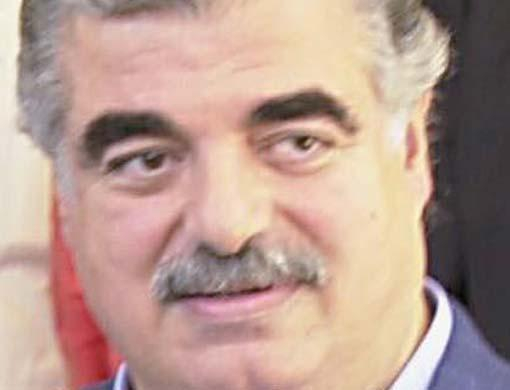
When Le Figaro published an article in 2006, shortly after the Israeli war on Lebanon, blaming Hezbollah for the 2005 murder of former Lebanese prime minister Rafik Hariri, many dismissed it as nothing more than the wishful thinking of an imaginative journalist.
A similar report then came out in a Kuwaiti daily in March 2009, followed by an alarming and very controversial report in Der Spiegel in May 2009, which said, "Investigators now believe Hezbollah was behind the Hariri murder".
Without quoting or naming a single source, the magazine said that a "special force" from Hezbollah had "planned and executed the diabolical attack" under orders from a certain Hajj Samil (no last name), who it described as Hezbollah's second-in-command and head of a special operational unit. Le Monde repeated the accusation in February 2010, followed by Israeli Chief-of-Staff Gabi Ashkenazi in June, who predicted massive instability in Lebanon in September, when the International Tribunal for Lebanon releases its indictments.
Top Hezbollah officials contend that all the rumours are an attempt to undermine the organisation — this time not with bullets, but with the Hariri Tribunal. However, Hezbollah is very resilient. UN Security Council Resolution 1559 could not disarm Hezbollah, and a 33-day war in the summer of 2006 could not defeat it. In May 2008, the Lebanese government tried — but failed — to tackle Hezbollah's telecommunications network at Beirut airport, as a prelude to its disarmament.
Pieces of the jigsaw puzzle are starting to fall into place. There were reports in November 2009 of Iranian weapons aboard a German ship headed for Hezbollah, followed by an April 2010 accusation that Hezbollah had received long-range Scud missiles from Syria. To top it all off, in September it is expected that the tribunal will announce that Hezbollah killed Hariri.
Despite all the talk in the media and on the street, nothing official has yet come out of the tribunal. However, Hezbollah officials believe that Israel, with the implicit backing of the US, is lobbying for the tribunal to name Hezbollah officials as the perpetrators of Hariri's murder.
The Israelis believe that if that were to happen, Lebanon would erupt into chaos and it would become very difficult for the state to function, as Prime Minister Sa'ad Hariri could not possibly continue "protecting and embracing" the arms of Hezbollah. The current rapprochement between Lebanese Sunnis and Shiites would collapse, Israelis believe, and Lebanon would become very hostile and unsafe territory for Hezbollah.
Neither Israel nor the US were satisfied with the results of the 2006 Lebanon War. The Israelis wanted to annihilate Hezbollah, secure the release of Israeli prisoners and reinforce their northern border. These objectives were not met. The White House wanted the war to prevent the Hezbollah model from being replicated in fragile states across the world, such as Pakistan, Afghanistan and Iraq.
The Pentagon wanted the war to test Iran's military power, through its ally Hezbollah, before venturing into its own adventure with Iran. But the war was a complete failure, and according to Israel's own assessment, Hezbollah's military arm is much stronger today than it was four years ago.
Pre-emptive attack
Last Friday, Hezbollah Secretary-General Hassan Nasrallah accused the tribunal of being "an Israeli project aimed at targeting the resistance in Lebanon". He added, "We hear that an indictment will be issued against Hezbollah members, and those making the claims [such as Ashkenazi] know of the investigations, and the timing of the indictment, whereas the investigations with us have barely started, and our brothers in Hezbollah went as witnesses rather than suspects."
Nasrallah added that Hezbollah was preparing a comprehensive report on the tribunal that would "soon" be made public, proving just how flawed, biased and politicised the investigation actually was. Over the weekend, Nasrallah met with his ally Michel Aoun to obtain Christian backing for his criticism of the tribunal.
Those hoping to pin Hariri's murder on Hezbollah fail to realise three fundamental facts. Firstly, Nasrallah has no intention of agreeing to extradite anyone. Secondly, Syria will also refuse to cooperate with any international campaign that incriminates Hezbollah. Thirdly, if such a scenario transpires, the results will be devastating for Lebanon, and especially for Sa'ad Hariri, who has supported the tribunal from day one, but will find himself forced to either write it off as an Israeli conspiracy, or accept it and shatter his alliance with Nasrallah — thereby bringing down his entire Cabinet.
According to sources in Beirut, during a June 25 meeting between Hariri and Nasrallah, the former noted that the tribunal was moving in the direction of implicating top Hezbollah officials.
To which Nasrallah replied, "If this is what happens, it will lead to 70 May 7s [in reference to a 2008 incident when Hezbollah waged and won a mini civil war on the streets of Beirut against armed groups from March 14]". Nasrallah added, "I will not allow the party's reputation to be messed with; we are a resistance whose history has never been linked to a political assassination."
Sami Moubayed is editor-in-chief of Forward Magazine in Syria.









